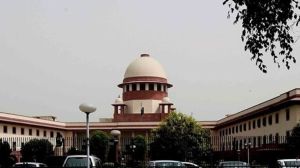CEPT University convocation: Citizenship ultimately about how we relate to each other, says Madhav Khosla
Associate Professor of Law at Columbia University Madhav Khosla reminded the students that “whether or not we are interested in law, law is interested in us and there is no escaping that,” and emphasised on how Constitutions have been at the forefront of establishing change in the modern world order.
 Madhav Khosla during the virtual event
Madhav Khosla during the virtual eventAssociate Professor of Law at Columbia University Madhav Khosla Saturday said citizenship is “ultimately about how we relate to each other” and is not just about how we relate to the state.
Khosla was speaking as the chief guest of the 16th convocation ceremony of the CEPT University in Ahmedabad held virtually in which 646 students were conferred degrees .
Khosla reminded the students that “whether or not we are interested in law, law is interested in us and there is no escaping that,” and emphasised on how Constitutions have been at the forefront of establishing change in the modern world order.
Speaking on the significance of being citizens and how the Indian Constitution matters to our fundamental being, Khosla pointed out that while in the middle of the 19th century most countries were not democracies, 100 years later, “there is nobody who really believes that no country cannot be a democracy.” Khosla also elaborated how democratic politics precede democratic citizens.
“The interesting historical moment that marks that shift..is the Indian Constitution….actually a lot of citizenship isn’t just about how we relate to the state, but it’s actually how we relate to each other…That citizenship is ultimately about really constituting the relationship between say, you and me. It’s not just about reconstituting the relationship between states,” he said.
“Secondly, the project of politics is constantly being created and recreated. So when a lot of the world told India’s founders that ‘look, India can’t be a democracy, because it’s poor. It’s illiterate. It has people of all these various types. It has all the divisions,’ the Indian answer was that you can create democratic politics. You can create democratic citizens through democratic politics,” said Khosla, whose research often focuses on comparative constitutional
law, especially in South Asia and India.
Opining that the worry of our times in the political context is not extremism but cynicism, Khosla elaborated, “…We have to realise that what’s significant around the world that we inhabit, is a certain kind of constructivism, is the idea that even people we don’t like are actually trying to remake the world… And I think that, the scariest thing or the most worrying thing, perhaps in our time, or in any time isn’t extremism, but a certain kind of cynicism,…that’s a fundamentally anti-constitutional thought, because what it means to think about constitutionally is that you can fully change the world but unlike you would do with war, constitutions allow you to do it peacefully.”







